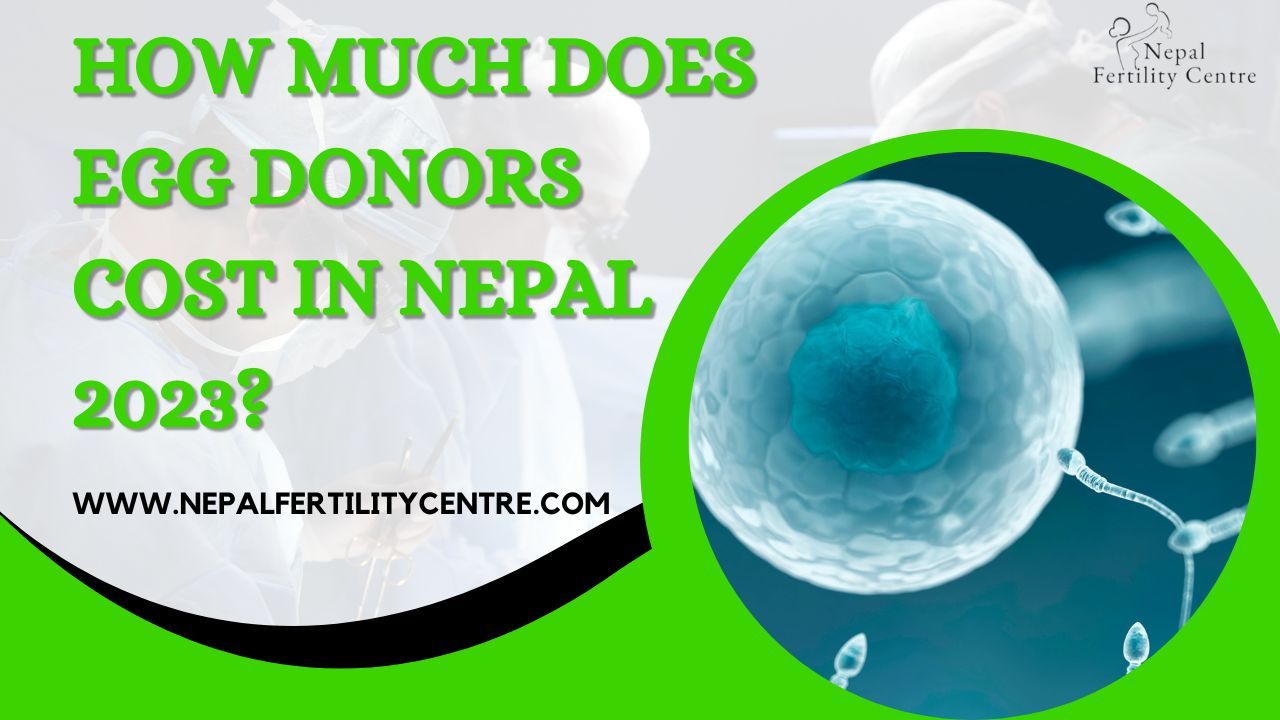For couples and individuals facing infertility challenges, egg donation can offer a beam of trust in their excursion towards life as a parent. Nepal has arisen as a well known objective for fruitfulness therapies, including egg gift, because of its reasonable and open clinical benefits. In this thorough aide, we dive into the expense of egg contributors in Nepal for 2023, exploring the factors influencing the expenses, the process of egg donation, and the avenues for achieving the dream of becoming parents through this altruistic and life-changing procedure.

Understanding Egg Donation
What is Egg Donation?
Egg donation is a vital aspect of assisted reproductive technology (ART) where a woman, known as the egg donor, voluntarily donates her eggs to help another individual or couple achieve pregnancy. The donated eggs are then fertilized with sperm in a laboratory through in vitro fertilization (IVF) to create embryos, which are later transferred to the uterus of the intended recipient or the gestational carrier.
The Significance of Egg Donation in Fertility Treatments
Egg donation plays a crucial role in helping individuals and couples with various fertility challenges build their families. It is particularly beneficial for women who are unable to produce healthy eggs due to premature ovarian failure, advanced age, or certain medical conditions. Same-sex male couples and single men wishing to have biological children also rely on egg donation to achieve parenthood through surrogacy.
Who Benefits from Egg Donation?
Egg donation offers hope to various groups of people, including:
- Women with Premature Ovarian Failure: Premature ovarian failure refers to the loss of ovarian function before the age of 40, leading to the depletion of eggs. These women often require donor eggs to conceive.
- Older Women: As women age, the quantity and quality of their eggs decline, making egg donation a viable option for older women seeking pregnancy.
- Genetic Disorders: Couples at risk of passing on genetic disorders to their offspring may opt for egg donation to avoid such genetic conditions.
- Same-Sex Male Couples: Same-sex male couples need both egg and gestational carrier services to have biological children.
- Single Men: Single men can become biological fathers through egg donation and surrogacy.
The Egg Donation Process – From Donor Selection to Recipient Treatment
The egg donation process involves several crucial steps:
- Donor Selection: Egg donors are meticulously screened for physical and psychological health, medical history, and fertility potential. Donors may be anonymous or known to the intended parents, depending on the chosen arrangement.
- Egg Stimulation: The selected egg donor undergoes ovarian stimulation with hormonal medications to encourage multiple egg production, increasing the chances of successful egg retrieval.
- Egg Retrieval: Once the eggs are deemed mature, the donor undergoes a minor surgical procedure to retrieve the eggs from her ovaries, usually under sedation or anesthesia.
- Fertilization and Embryo Culture: The retrieved eggs are fertilized with sperm (from the intended father or a sperm donor) in a laboratory. The resulting embryos are cultured for a few days to monitor their development.
- Embryo Transfer: The best-quality embryos are carefully selected and transferred into the uterus of the intended recipient or the gestational carrier.
- Pregnancy Test and Follow-up: Around two weeks after the embryo transfer, a pregnancy test is conducted to determine if the procedure was successful. If successful, the recipient or gestational carrier undergoes prenatal care and regular check-ups until childbirth.
Legal and Ethical Aspects of Egg Donation in Nepal
Nepal has legal provisions regarding egg donation and ART procedures, aiming to protect the rights and interests of all parties involved. Clear and transparent agreements between the egg donor, recipient, and the fertility clinic are essential to avoid legal complications and ensure a smooth process.
In Additions, Egg donation is a significant demonstration of liberality that offers a pathway to life as a parent for some people and couples confronting fertility challenges. Understanding the interaction and meaning of egg gift is essential for those thinking about this choice on their excursion towards satisfying their fantasy about becoming guardians. The following segments will dig into the expense breakdown of egg donation in Nepal, factors impacting costs, and elective choices accessible to confident beneficiaries.

Egg donor Treatment: Much more than just getting pregnant.
(egg donors cost in Nepal 2023): Infertility treatments are a mentally and physically tiring process where both the parents have to go through a lot. And a flood of questions starts arising in our minds. Will the baby have my genes? Will the baby look like me? Sometimes, emotional plus psychological challenges will make you doubt your decisions.
But, in front of parenthood, couples are ready to take all the chances. Thus, here comes our role. Nepal Fertility Centre makes sure to resolve every query and doubt of yours and help you escapade the joy of having a child.
Egg donation acts as a perk for couples having issues conceiving a baby, plus the Egg donor cost in Nepal holds a high success rate.
Egg donor treatment- A scientific approach towards modern future
Egg donor treatment is a solution for women who are unable to produce their eggs for fertilization. The process includes the ova or egg donation of a healthy fertile woman.
The procedure involves retrieving eggs from the donor, fertilizing the eggs in vitro and then transferring the embryo to the intended mother. The entire process is carried out in-vitro with a low number of failures.
Recommendation of Egg donor cost in Nepal-
IVF has set a bar for the fertility success rate. It allows you to tackle the most challenging situation of life and go through the most impactful parenthood decision. The egg donor treatment in Nepal is suggested to-
Egg Donor treatment is recommended to-
- Women’s with genetic infertility disorder
- Women with a low success rate for eggs
- Women with multiple fertility challenges
- Women’s who are unable to hold the eggs due to age or premature menopause
- Women’s who are born without ovaries
- Same-sex couples
- Single parent seeking surrogacy
Cost Breakdown of Egg Donation in Nepal

Egg donation has become a promising option for couples and individuals facing infertility issues, providing them with an opportunity to experience parenthood. In Nepal, the cost of egg donation is relatively affordable compared to other countries, making it an attractive choice for international patients as well. To better understand the financial aspects of egg donation in Nepal, let’s delve into the cost breakdown of this altruistic and life-changing procedure.
- Agency or Clinic Fees: One of the significant components of the cost involves agency or clinic fees. Fertility agencies or clinics play a crucial role in the egg donation process, assisting with donor matching, coordination, and ensuring all legal and ethical aspects are met. These fees cover the administrative and professional services provided by the agency or clinic throughout the egg donation journey. Agency fees can vary depending on the reputation and services offered by the agency or clinic.
- Donor Compensation: Egg donors undergo a rigorous screening process and hormonal stimulation to produce multiple eggs. As a gesture of appreciation and recognition of the donor’s time, commitment, and physical efforts involved, recipients provide a compensation package to the donor. The compensation is intended to cover the donor’s expenses, time off work (if applicable), and any inconvenience experienced during the process. The amount of donor compensation can differ based on factors such as donor experience, attributes, and the specific egg donation program.
- Egg Retrieval and Laboratory Fees: The egg retrieval procedure involves the surgical removal of mature eggs from the donor’s ovaries under anesthesia. This surgical process requires skilled medical professionals and specialized equipment, contributing to the overall cost. Additionally, laboratory fees cover the handling, processing, and fertilization of the retrieved eggs. These fees are vital in ensuring the eggs’ safety and quality throughout the treatment process.
- Medical and Psychological Screening: Egg donors undergo comprehensive medical and psychological evaluations to ensure they are physically and mentally fit for the egg donation process. These screenings are critical to safeguard the health and well-being of both the donor and the recipient. Medical screenings assess the donor’s reproductive health, while psychological evaluations ensure they are emotionally prepared for the procedure. The cost of these screenings is typically borne by the recipient and includes the fees for medical professionals and required tests.
- Donor Medications: Egg donors undergo hormonal stimulation to promote the development of multiple eggs during their menstrual cycle. The cost of fertility medications, which includes injections and other medications, is covered by the recipient. The exact dosage and duration of medication can vary based on the donor’s response to the treatment. The expenses for fertility medications form a significant part of the overall cost of egg donation.
- Travel and Accommodation: In some cases, egg donors may reside outside the location of the fertility clinic. Recipients are responsible for covering the travel and accommodation expenses of the egg donor, ensuring they can access the clinic for medical appointments, screenings, and the egg retrieval procedure. These expenses can vary based on the donor’s location and the distance traveled to the clinic.
It is essential to note that the cost breakdown of egg donation in Nepal might fluctuate relying upon the singular center or organization, the particular egg donation program picked, and the extraordinary conditions of the beneficiary and egg giver included. Furthermore, any discretionary administrations, like extra ripeness medicines or pre-implantation hereditary testing (PGT), may cause extra costs.
Participating in an egg donation program can be a transformative and hopeful experience for recipients, offering them the chance to build their family. Understanding the cost breakdown of egg donation in Nepal empowers recipients to plan their fertility journey effectively and make informed decisions to achieve their dream of parenthood.
Factors Influencing Egg Donor Costs in Nepal
Egg donation is a critical component of assisted reproductive technology, offering a viable solution to individuals and couples facing infertility challenges. The cost of egg donors in Nepal can vary based on several factors that play a significant role in determining the overall expenses associated with this procedure. Understanding these factors is crucial for individuals seeking egg donation as a fertility option. Let’s explore the key factors that influence egg donor costs in Nepal:
- Donor Experience and Attributes: The experience and unique attributes of the egg donor can influence the cost. Experienced donors or those with specific desirable traits, such as proven fertility, exceptional academic achievements, or artistic talents, may command higher compensation. The demand for certain attributes can also contribute to the variation in egg donor costs.
- Donor Ethnicity: Egg donor costs may be influenced by the ethnic background of the donor. In some cases, recipients may seek egg donors with a similar ethnic or cultural background, and this preference can affect the compensation offered to donors from specific ethnic groups.
- Donor Availability and Demand: The supply and demand for egg donors can also impact the overall cost. If there is a limited pool of available egg donors at a particular time, the demand may be higher, leading to higher costs. Conversely, an ample supply of egg donors can result in more competitive pricing.
- Fertility Clinic or Agency: Different fertility clinics or agencies may have varying fee structures for egg donation services. The reputation and success rates of the clinic or agency, as well as the level of personalized care provided, can contribute to the variation in costs.
- Legal and Administrative Expenses: The legal and administrative aspects of egg donation, such as contracts, donor compensation management, and paperwork, can also add to the overall cost. Ensuring compliance with legal and ethical guidelines is essential, which may entail additional administrative expenses.
- Fresh vs. Frozen Egg Donation: The choice between fresh and frozen egg donation can also influence the cost. Fresh egg donation typically involves synchronization of the donor’s menstrual cycle with the recipient’s, while frozen egg donation allows for more flexibility in timing but may require additional expenses for egg vitrification and storage.
- Shared Egg Donation: Some recipients may opt for shared egg donation programs, where the cost is divided among multiple recipients using the same egg donor. This option can reduce costs for individual recipients but may involve more logistical coordination.
- Insurance Coverage and Legal Considerations: The availability and extent of medical insurance coverage for egg donation treatments can also impact the overall cost for recipients. Legal considerations related to egg donation, such as donor anonymity and parental rights, can influence the overall expenses.
In General, Egg donation has given trust and happiness to endless people and couples confronting infertility challenges. The expense of egg donors in Nepal is impacted by a mix of elements, including contributor credits, accessibility, facility or organization decisions, lawful contemplations, and the kind of egg donation liked. Prospective parents considering egg gift as a fruitfulness choice ought to completely examine the expenses with the picked ripeness center or office and investigate possible monetary help or shared egg donation choices. Through a combination of informed decision-making and the compassionate support of medical professionals, recipients can embark on their journey towards parenthood with confidence and optimism.

IVF process with Egg donor
The IVF process with an egg donor includes a few stages that permit couples or people encountering barrenness or hereditary issues to get an opportunity at being a parent. This cycle is a blend of IVF (In Vitro Treatment) and egg gift. Here is a bit by bit outline of the IVF process with an egg donor:
Initial Consultation and Assessment
The process begins with an initial consultation with a fertility trained professional or a regenerative endocrinologist. During this meeting, the couple or individual talks about their clinical history, fruitfulness concerns, and the choice to utilize an egg giver. The fruitfulness expert will make sense of the whole interaction, answer any inquiries, and guarantee that the imminent recipient(s) are reasonable contender for IVF with an egg donor.
Egg Donor Selection
The next step is selecting a suitable egg donor. Couples or individuals can choose an anonymous or known egg donor through a fertility clinic or an egg donor agency. The donor undergoes rigorous medical, psychological, and genetic screening to ensure their suitability for egg donation.
Synchronization of Cycles
Once the egg donor is selected, the menstrual cycles of the donor and the recipient(s) are synchronized using hormonal medications. This ensures that the recipient’s uterine lining is ready to receive the embryos created from the donor’s eggs.
Egg Retrieval from the Donor
The egg donor undergoes ovarian stimulation using fertility medications to encourage the development of multiple eggs. When the eggs are mature, they are retrieved from the donor’s ovaries using a minimally invasive procedure called follicular aspiration. This procedure is usually performed under sedation or anesthesia.
Fertilization and Embryo Culture
After the egg retrieval, the eggs are fertilized with the recipient’s partner’s sperm (or donor sperm if needed) in the laboratory. In some cases, Intracytoplasmic Sperm Injection (ICSI) may be used to achieve fertilization. The fertilized eggs, now called embryos, are cultured in the laboratory for several days.
Embryo Transfer
At the appropriate time, at least one sound incipient organisms are chosen for move into the beneficiary’s uterus. The incipient organism move is a somewhat straightforward method that doesn’t need sedation. The quantity of incipient organisms moved relies upon different elements, including the beneficiary’s age and medical history.
Pregnancy Test and Follow-up
About two weeks after the embryo transfer, a pregnancy test is led to decide whether the IVF cycle was fruitful. Assuming that the test is positive, the beneficiary will keep on getting follow-up care from the fertility center all through the beginning phases of pregnancy.
In Additions, The IVF process with an egg donor is a deep rooted and fruitful technique for accomplishing pregnancy in situations where the lady’s own eggs are not reasonable or accessible. This fertility treatment choice offers expectation and opportunities for couples or people battling with infertility, assisting them satisfy their fantasies of being a parent with the liberality of an egg giver. It is fundamental for look for direction from a certified fertility specialist matter expert and a reputable fertility center to guarantee a smooth and effective IVF journey with an egg donor
Along with the cost of an egg donor in Nepal comes the risks and side effects of egg donor treatments-
There are shallow side effects of egg donor treatment, but why take risks? You should be aware of the slight side effects and risks of egg removal and egg insertion for fertilization.
- Rapid weight gain
- Difficulty in breathing
- Vomiting and nausea
- Stomach pain

Alternatives and Financial Considerations
Egg donation can be a transformative path to parenthood for individuals and couples facing fertility challenges. While the cost of egg donors in Nepal 2023 offers an affordable option, there are alternatives and financial considerations that recipients may explore to make this journey more accessible. Understanding these alternatives and financial aspects can provide recipients with additional choices and support in their pursuit of parenthood.
- Fresh vs. Frozen Egg Donation: Recipients have the option to choose between fresh and frozen egg donation. Fresh egg donation involves synchronizing the menstrual cycles of the donor and the recipient, allowing the eggs to be retrieved and fertilized in real-time. On the other hand, frozen egg donation allows recipients to select from a diverse pool of frozen donor eggs, offering greater convenience and reduced costs, as there are no synchronizations involved. The choice between fresh and frozen egg donation depends on individual preferences, medical requirements, and budget considerations.
- Shared Egg Donation Programs: Some fertility clinics and agencies in Nepal offer shared egg donation programs, also known as egg sharing or split cycle programs. In these programs, a single egg donor’s retrieved eggs are shared between two or more recipients, reducing the overall cost for each recipient. Shared egg donation programs can be an excellent option for recipients who seek a more cost-effective approach to egg donation.
- Financial Assistance and Grants: To support recipients on their journey to parenthood, some fertility clinics and organizations offer financial assistance or grants for fertility treatments, including egg donation. These programs aim to ease the financial burden and increase accessibility to fertility treatments. Recipients are encouraged to inquire about available financial aid options and eligibility criteria with their chosen fertility clinic or through reputable fertility support organizations.
- Legal and Insurance Considerations: Before embarking on the egg donation process, recipients should thoroughly understand the legal implications involved. Legal agreements are drafted between the donor and the recipient to protect the rights and responsibilities of both parties. Additionally, recipients should review their medical insurance coverage to determine if it includes fertility treatments or egg donation procedures. Understanding insurance coverage can help recipients plan for potential out-of-pocket expenses.
- Consultation and Support: Receiving guidance and support from fertility specialists and counselors is an essential aspect of the egg donation journey. Before committing to a specific fertility clinic or egg donor program, recipients should schedule consultations to discuss their options, address any concerns, and gain a clear understanding of the overall process. Counseling services are valuable in providing emotional support and preparing recipients for the emotional aspects of egg donation.
In Additions, As recipients explore the alternatives and financial considerations surrounding egg donation, they can settle on informed choices that line up with their clinical requirements, inclinations, and spending plan. Whether selecting new or frozen egg donation, investigating shared egg gift programs, looking for monetary help, or understanding legitimate and protection perspectives, beneficiaries can set out on their excursion to life as a parent with certainty and trust. The endowment of egg donation and the help of the clinical local area set out a significant freedom for beneficiaries to satisfy their dreams about becoming guardians and praise the delight of family-working through the surprising demonstration of egg donation.
What is the cost of an egg donor in Nepal?

The cost of an egg donor in Nepal can vary depending on several factors, including the fertility clinic or agency chosen, the donor’s attributes, and the specific requirements of the recipient. On average, the cost of an egg donor in Nepal can range from NPR 250,000 to 400,000 or more.
This cost commonly covers office or facility charges, donor remuneration, clinical and mental screening, benefactor meds, egg retrieval and research center expenses, and any important travel and convenience costs for the contributor. It’s fundamental for imminent beneficiaries to talk with their picked fertility clinic or agency to get a precise cost breakdown and understand the financial associated with the egg donation process.
Donor egg success rate in Nepal-
IVF success rate with donor egg varies, where the success is 60% with a fresh embryo. On the other hand, the success rate with frozen donor egg is 45-50%. Moreover, the success rate also varies from clinic to clinic, somewhere it may differ from one clinic, while somewhere, it changes according to the situation and condition of patients.
Plus, with the increasing abnormalities, the charges of an egg donor in Nepal fluctuate.
The Gift of Parenthood through Egg Donation
- The Emotional Aspect of Egg Donation: Egg donation is not only a medical process but also a profoundly emotional journey. For recipients, it brings hope and joy, knowing that they have a chance to experience the joys of parenthood. The selfless act of egg donors, who give the gift of life to complete strangers, fosters a deep sense of gratitude and connection between donors and recipients. The journey of egg donation is marked by compassion, empathy, and the fulfillment of a lifelong dream.
- Success Stories and Hope: The stories of couples who have embraced being a parent through egg donation motivate trust and versatility. These endearing stories exhibit the groundbreaking force of egg donation, transforming the fantasies of being a parent into the real world. Every example of overcoming adversity builds up the conviction that supernatural occurrences can occur, and with the backing of humane egg donors and devoted clinical groups, the endowment of life as a parent turns into an esteemed reality for some. These rousing accounts give desire to innumerable couples and people leaving on their own egg donation journeys, realizing that they also can encounter the unmatched delight of becoming parents.

Conclusion
Egg donation offers a life-changing opportunity for couples and individuals seeking parenthood. The cost of egg donors in Nepal 2023 makes this option more accessible to many hopeful parents. By understanding the factors influencing the expenses and exploring alternative options, recipients can embark on their journey towards parenthood with confidence and hope. Egg donation is not just a medical procedure; it’s a testament to the strength of human compassion and the gift of creating families, proving that the dream of parenthood can become a reality through the kindness of egg donors and the support of the medical community.
FAQ
1. What is the average cost of egg donors in Nepal?
The average cost of egg donors in Nepal can vary based on several factors, but it generally ranges from NPR 150,000 to 300,000 or more.
2. What does the egg donor cost typically include?
The egg donor cost usually includes the compensation provided to the donor, medical and psychological screening, egg retrieval procedure, and agency or clinic fees.
3. Does the egg donor cost vary based on the donor’s attributes or experience?
Yes, the egg donor cost may vary depending on factors like the donor’s attributes, such as education, ethnicity, and physical characteristics, as well as their previous experience as an egg donor.
4. Are there additional expenses involved in the egg donation process?
In addition to the egg donor cost, recipients may need to consider expenses for fertility medications, legal and administrative fees, and medical screenings for the recipient.
5. Is egg donation a legal and ethical procedure in Nepal?
Yes, egg donation is a legal and ethical procedure in Nepal, provided it follows the country’s guidelines and regulations regarding fertility treatments.
6. Are there financial assistance options available for recipients considering egg donation in Nepal?
Some fertility clinics or agencies in Nepal may offer financial assistance or payment plans to support recipients during the egg donation process. It is advisable to inquire about available options during the initial consultation.
Read More:

